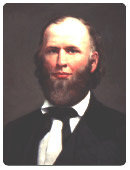Former justices

Justice Byron Paine
Wisconsin Supreme Court Justice: 1859–1864; 1867–1871Life: 1827–1871
"Without the states there can be no union; the abrogation of state sovereignty is not a dissolution of the union, but an absorption of its elements. He is the true man, the faithful officer, who is ready to assert and guard every jot of power rightfully belonging to each, and to resist the slightest encroachment or assumption of power on the part of either." – Byron Paine, counsel in Ableman v. Booth (1854)
Byron Paine was born October 10, 1827, in Painesville, Ohio. In 1847, he and his father moved to Milwaukee, where Paine studied law. He was admitted to the Wisconsin Bar in 1849.
As a young lawyer, Paine was a close friend of Sherman M. Booth, a Wisconsin abolitionist who was arrested for violating the Fugitive Slave Act after helping to free Joshua Glover, a fugitive slave from Missouri who was arrested in Racine.
In 1854, Paine represented Booth, without pay, in the famous Ableman v. Booth case. Paine appeared before the Wisconsin Supreme Court and "made one of the clearest, most conclusive and most eloquent arguments against the constitutionality of the fugitive slave law made in any court in the country," said Justice Harlow S. Orton at Paine's memorial service. Paine won the case, becoming the only lawyer to successfully argue in a state court that the Fugitive Slave Act violated the sovereignty of the northern states. The U.S. Supreme Court later reversed the Wisconsin Supreme Court's ruling.
Edward G. Ryan, opposing counsel in the Booth case, who later became chief justice of the Wisconsin Supreme Court, said of Paine's work on the case: "The first opportunity I had of forming an estimate of his high ability, was in the famous case under the fugitive slave act, in 1854 and 1855. He was employed for the defendant; I, for the United States. We both brought to the case, not only ordinary professional zeal, but all the prejudices of all our lives. He was a frank and manly abolitionist. I was as decidedly what was called pro-slavery. We were both thoroughly in earnest...I thought him a fanatic. He probably thought me one. Possibly we both were."
In 1856, Paine served as the clerk of the state Senate. In 1857, he was elected judge in Milwaukee County and served until his election to the Wisconsin Supreme Court in 1859. In August 1864, near the end of the Civil War, he resigned from the bench to join the military. He was appointed lieutenant-colonel of the 43rd Regiment of Wisconsin Volunteer Infantry.
There was much speculation as to why Paine chose to resign from the bench at such a late stage in the war. Chief Justice John B. Winslow wrote that Paine had been elected to the Supreme Court based on his strong state's rights position, a position that became very unpopular at the outbreak of the Civil War. The state's rights movement laid the groundwork for the southern states' secession from the Union. Winslow wrote that enlisting in the military was "the only effective way to prove his [Paine's] absolute loyalty to the Union and his hatred of secession..."
At the end of the war, Paine returned to Milwaukee to practice law. Two years later, he was appointed to the Wisconsin Supreme Court to fill the vacancy created by Justice Jason Downer's resignation. Downer had filled Paine's seat when he was away at war, but did not enjoy the heavy workload and stepped down when Paine returned.
Paine was an avid reader outside of the law and enjoyed studying theology. He and his wife Clarissa had three sons. Paine served on the Supreme Court until his health failed in November 1870 and died January 13, 1871.

